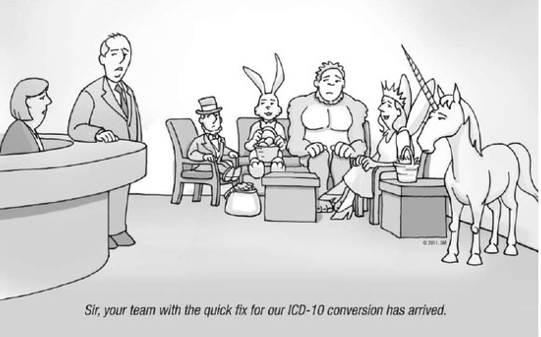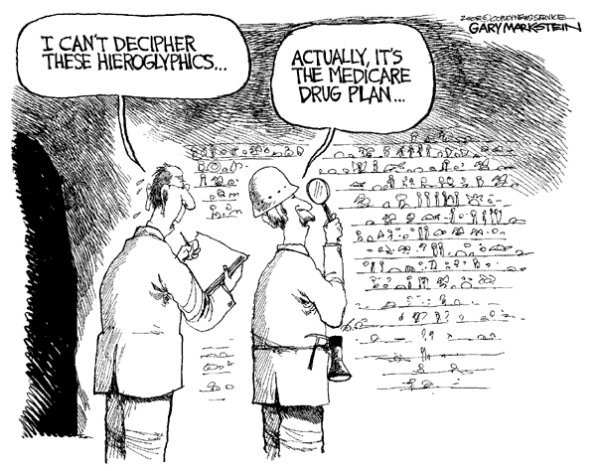The Medicare Payment Advisory Commission (MedPAC) is required by law to annually review Medicare payment policies and make recommendations to Congress. Consistent with previous Reports, MedPAC’s recommendations address long term concerns with increasing healthcare spending and short term concerns with various Fee-For-Service (FFS) policies.
Medical Billing Blog
MedPAC Submits March Annual Report to Congress
Yesterday, by a voice vote, the House of Representatives passed legislation postponing the 24% physician fee schedule cut slated to take effect on April 1, 2014. However, the legislation went well beyond just temporarily fixing the SGR problem, it also made a number of other changes that will have long-lasting implications. A listing of those changes is at the end of this message.
CMS: No ICD-10 Delay; AMA - It Costs too Much!
The AMA has asked the Department of Health and Human Services to reconsider mandating the switch to ICD-10 on October 1, 2014. In remarks delivered February 27th at the 2014 HIMSS Annual Conference in Orlando, Florida, CMS Administrator Marilyn Tavenner publicly rejected that call. “There are no more delays and the system, will go live on Oct 1.” Tavenner said.
Kathleen Sebelius, the secretary of health and human services, said Wednesday that the Obama administration would not extend the deadline for people to sign up for health insurance or delay the requirement for most Americans to have coverage. There will also be no delay in the penalty most Americans face under President Barack Obama's healthcare reform law if they fail to obtain health coverage this year. Last year, embracing nonpartisan estimates for the Affordable Care Act, Health and Human Services Secretary Kathleen Sebelius set a benchmark for the new insurance marketplaces: "Success looks like at least 7 million people having signed up by the end of March 2014," she said to NBC. Enrollment, however, began at a terribly slow pace in October because of all the technical problems with HealthCare.gov, the federal health exchange website serving 36 states. Some state-run health exchange websites have had their own problems as well. Within that context, Sebelius on Wednesday redefined what success looks like: "Success looks like millions of people with affordable health coverage, which we will have by the end of March," she told the House Ways and Means Committee. The administration released the latest enrollment figures on Tuesday—revealing that some 4.2 million Americans have signed up for coverage on the new exchanges. However, that figure does not include how many people have actually paid for their plans—a metric that could make the actual number of enrollees significantly lower.
Proposed Medicare Part D Changes Are Postponed
The Obama administration has dropped plans to change the Medicare prescription drug program amid criticism from industry, patient advocacy groups and lawmakers that the changes would limit seniors’ access to certain medications and choice of plans. CMS Administrator Marilyn Tavenner wrote in a letter to Congress Monday that she was shelving changes proposed in January that could have loosened the requirements that Medicare Part D insurance plans cover a broad range of drugs in six “protected classes” of medications. Since the start of Medicare’s prescription drug benefit in 2006, the government has required insurers to cover “all or substantially all” drugs in six treatment areas. The administration proposed in January to lift the requirement for three types of medications: immunosuppressant drugs used in transplant patients; antidepressants; and antipsychotic medicines, used to treat schizophrenia and certain related disorders. Medicare officials had said the proposal would have saved money and reduced the overuse of drugs.
In late February, CMS announced a temporary suspension of NEW RAC audits, effective February 21st. The Recovery Audit Contractors (RACs) currently under contract to CMS were directed to discontinue sending post-payment Additional Documentation Requests (ADRs) to providers until further notice.
Now Available: Subsidies for Insurance Policies Bought Outside Exchange
With just a month left for Americans to select health plans this year through new insurance marketplaces, the Obama administration is bending some rules to prevent people from being stranded without coverage, especially those in states where their own state-run online exchange has failed disastrously. The new policy applies to people who — because of “technical issues” — were prevented in trying to buy insurance through an online exchange and signed up for a health plan outside the marketplace. They will now be allowed to sign up for coverage in the exchange and get federal subsidies “on a retroactive basis,” going back to the date on which they first enrolled in a health plan outside the exchange. The state-run exchanges in some of these states — Oregon, Maryland, Massachusetts and Hawaii in particular — have experienced more technical problems than even the federal website. Consumers in those states are still having difficulty enrolling five months after the launch. Federal officials said they had agreed to provide such assistance retroactively because technical problems had prevented consumers from using online exchanges to obtain insurance and financial aid in some states. The Obama administration’s decision came as a surprise because the Affordable Care Act is clear: Federal subsidies are available only to people who enroll in a “qualified health plan” through an exchange. The HHS change will allow those who tried to sign up on their state-run exchanges, but couldn’t, to retroactively obtain the subsidies they would have been eligible for, even if they ended up purchasing healthcare through a private insurer. The privately purchased plans must still meet certain basic requirements of the healthcare law.
There will be no more delays to the October 1 deadline to implement the International Classification of Diseases-10th revision (ICD-10) coding system.
Major Spending Cut Proposed For Medicare Advantage
The Obama administration is proposing a major cut in 2015 payments to Medicare Advantage. An annual notice released Friday after the markets closed would reduce Medicare Advantage spending by 3.55 percent. The CMS based its projections, which will differ across the country based on a variety of factors, on an expected 3.55% decline in the Medicare Advantage growth rate factor and an expected decline of 1.65% in per capita expenditures in the fee-for-service portion of the senior citizen healthcare program. The annual rate adjustment — which is only one of the payment changes — is calculated through a complicated set of formulas, and analysts were still sorting out the 148-page proposal that CMS released late in the afternoon to assess the total impact on the increasingly popular program for seniors. The cut is bigger than the industry expected, given estimates the government provided in December. Last year, the administration proposed 2.2 percent in cuts for Medicare Advantage plans. After a six-week campaign that included paid advertising inside the Beltway and beyond, and letters from at least 160 supportive lawmakers from both parties, CMS reversed a key assumption that had long been built into its estimates and instead put forward a 3.3 percent growth rate. According to a new analysis from consulting firm Avalere Health, enrollment in Medicare Advantage plans rose in 2014 by 8.9 percent to 15.9 million enrollees, up from 14.6 million in 2013. Approximately 30 percent of Medicare beneficiaries are enrolled in the plans, which are offered by private insurance companies.
On January 17th, CMS announced a new policy regarding Freedom of Information Act (FOIA) requests for the disclosure of how much Medicare pays individual physicians. For the past 30 years, this information has been protected from FOIA requests under the Personal Privacy Exemption (Exemption 6) of the act. Under the new policy,CMS will begin examining each FOIA request on a case-by-case basis to determine if the information requested should be exempt from FOIA requests.




















